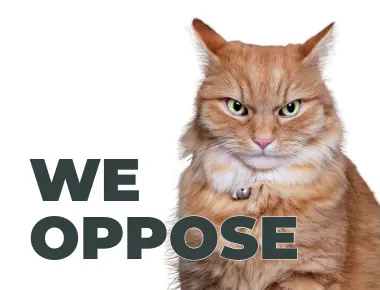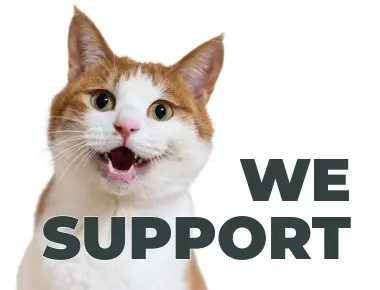Animal Welfare Law and Policy
Our mission goes beyond the daily operations of our animal shelter and adoptions program. We are also committed to education and advocacy as a way of preventing companion-animal abandonment, neglect, and cruelty. We know you're an animal advocate too, and we'd like you to join us. Every legislative session, hundreds of bills that affect our daily lives are proposed. On this page, we'll share with you the changes that might be coming that would impact pets, animal-sheltering, or animal-welfare more broadly, and we might ask you to help us speak for companion animals in Illinois.
As an independent nonprofit with a local focus, our law and policy program will focus on sharing changes at the Illinois State level, and any local ordinances that might affect our typical adoption radius.
If you find animal legislation and policy issues interesting like we do, please sign up for our newsletter dedicated to the topic. Feel free to reach out to our Executive Director, Mary Tiefenbrunn, if you'd like to get even more involved in advocacy for Illinois animals.
If you're affiliated with an Illinois animal rescue or shelter, consider joining the Illinois Animal Welfare Federation, an organization dedicated to the education and training of animal-welfare professionals and staff, and addressing legislative and policy issues that impact those agencies.
Our primary goal on this page is to provide you with information so that you can make an informed decision about a proposed change to the law that would impact you or an issue you care about."
Legislation we're watching:
Please bear in mind that the expression of our support or opposition to proposed legislation does not represent the opinions of individual employees, board members, corporate sponsors, or our supporters. Our opinions are based on decades of animal sheltering and non-profit management experience, and legislation is considered based on how it will affect our mission. Please also keep in mind that we might appreciate a piece of proposed legislation in spirit but have concerns or questions about how it's proposed to be carried out. Our primary goal on this page is to provide you with information so that you can make an informed decision about a proposed change to the law that would impact you or an issue you care about. We encourage you to read any proposed legislation you are interested in, in its entirety, and we hope to provide you with commentary and resources that will help you make an informed decision on bills and regulations.

Illinois House Bill 1556
HB1556 attempts to amend the Humane Pet Store Law of 2022 and permit commercial breeders to once again sell puppies and dogs to pet stores in Illinois. We see these changes as regressive and believe they will bolster "puppy mills" in Illinois and throughout the country.
Since the passing of the Humane Pet Store Law of 2022, pet stores in Illinois can only sell dogs they have acquired from animal shelters or animal control facilities. For some time now, shelters throughout the country have been struggling with high capacities of adoptable dogs. Now is not the time to permit commercial breeders to take away opportunities of homeless pets to be adopted.
Read the full text of the bill here.

Illinois House Bill 3367
This bill allows courts to appoint a special advocate to monitor cases involving the injury, health, or safety of a cat or dog, and make recommendations for their wellbeing. HB3367 is an opportunity for animal welfare advocates to ensure that the health and safety of any animal is considered during legal proceedings.
Why is a Special Advocate necessary? Often State’s Attorneys’ offices do not have the resources to adequately develop animal cruelty cases, which require knowledge of animal cruelty laws, human and social psychology, specialized evidence collection techniques, veterinary forensics, and animal health/behavior. Even when prosecutors focus intensely on the prosecution of a cruelty crime, they might not have the resources to look after the welfare of the animal(s) while the case is ongoing.
How could a Special Advocate assist in prosecuting a cruelty case? A Special Advocate’s specific role will depend in part on the nature of the case. The Special Advocate might assist in the presentation and evaluation of relevant evidence; identify and vet specialized witnesses; conduct legal research; secure proper methods of intervention for the people and animals involved in the crime; and assist the courts in working toward consistency in the enforcement of Illinois’ animal protection laws. The Special Advocate could also serve as liaison to the concerned citizens and animal activists in the community.
Read the full text of the bill here.

Illinois House Bill 3322
This bill permits law enforcement officers to take possession of all or some of the pets in the care of someone being arrested for violation of owner's duties. "Owner's duties" are things like providing pets with food, water, shelter, and humane treatment. We believe that pets should be removed from the people actively causing them harm, and HB3322 would permit law enforcement officers to legally remove those pets immediately.
The “Owner’s Duties” section of the Act (Section 3) requires owners to provide animals with (1) a sufficient quantity of good quality food and water; (2) adequate shelter and protection from the weather; (3) veterinary care when needed to prevent suffering; and (4) humane care and treatment. The Act also sets forth a number of restrictions on tethering animals outdoors under the “Owner’s Duties” requirements.
Currently, the Humane Care for Animals Act does not include violations of Section 3 in the list of offenses authorizing immediate lawful impoundment of an owner’s animals. Many violations of Owner’s Duties result in significant animal suffering. In such circumstances, law enforcement and animal control officers should be able to remove animals immediately. HB3322 seeks to make this possible.
HB3222 also extends the time allowed in which State’s Attorneys may file a petition for permanent forfeiture of animals from 14 days to 30 days from the date of seizure. This time frame makes the deadline more realistic given the timelines and resources under which prosecutorial and law enforcement personnel function.
Read the full text of the bill here.
Join the Law and Policy Newsletter
We will periodically send you updates on legislation we're watching, or share what actions YOU can take to advocate for companion animals. This is an informal newsletter that you'll only receive if you choose to, although a few times a year we might send an email on this subject to all of our friends, and invite more to join our growing community of animal advocates.
Resources
Filing a Witness Slip
When we ask for your help on legislation, CCHS will always link you directly to Committee Hearing Details. If you're tracking anything on your own, start in our "Stay Up to Date" tab for information on how to locate a bill from the State Assembly website.
Things to keep in mind when you're filing a witness slip:
- The bill might not be called by the committee on the hearing date.
- You can file a witness slip every time the committee meets.
- Do not enter a Firm/Business or Agency unless you are authorized to enter the official position of an organization or business. Most people will enter slips as "Self"
- If you are entering a witness slip on behalf of your business, you can enter a second slip as a citizen. For example, on bills concerning animal tenancy, an apartment building owner might want to file a witness slip on behalf of their company, and a separate slip on their personal behalf.
Section 1: Identification
Fill out your personal information. Where it says "Firm/Business or Agency", more than likely you will be entering a Witness Slip as an Illinois resident and voter. If so, you'll enter "Self" or "n/a" in this field. You can enter the name of a business or organization if you are authorized to speak on their behalf. Always make sure that you have the permission of an organization before filing
Please do not indicate that you are representing Champaign County Humane Society. The Society’s position is represented by the vote of its Director. Plus, it will be more meaningful for legislators to see that numerous individual voters are also expressing their opinion about the legislation at issue.
Section 2: Representation
If you are filling out the witness slip as an individual, you can enter “Self” or “n/a”. If your witness slip should be recorded as the official position of a company or organization that you can speak for, please note that here. The Society’s official position is represented by the witness slips of its Director.
Section 3: Position
Select your position, "Proponent" if you support the passing legislation, and "Opponent" if you do not want the bill to move forward. We will always share our position with you if we are asking you to act.
Section 4: Testimony
We suggest marking a "Record of Appearance Only", which records your opinion and requires no further action from you at the particular committee hearing. If you're interested in entering a formal testimony in your independent capacity, You can check the General Assembly website for protocols on filing additional testimony. When filing additional testimony, again please remember that you are representing yourself, and not the Champaign County Humane Society.
Witness slips tell legislators that you are paying attention. Your voice matters!